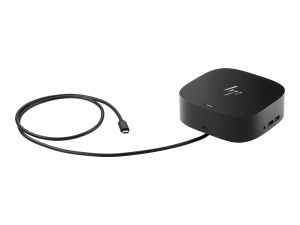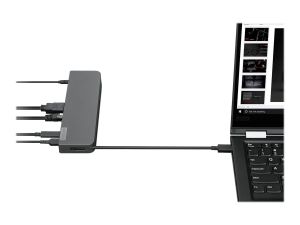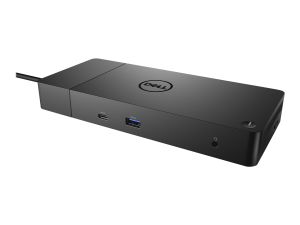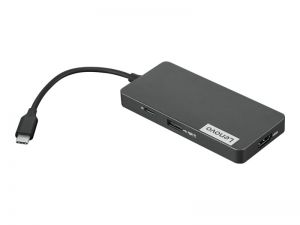Laptop Docking Stations
Docking stations (also known as port replicators or docks) enable laptops and other electronic devices to connect to a range of peripheral devices such as mice, keyboards and monitors. Docks are commonly used to enable a laptop to be used as a desktop replacement. The laptop can be docked when in the office allowing the user to benefit from the desktop’s dedicated keyboard, mouse and bigger screen.
There are four main types of docking stations. Port replicators act as a bunch of extension cables by combining a number of different ports in one handy box. You plug all your PC peripherals into the port replicator which then connects to your laptop via a single cable rather than a messy tangle of wires. A breakout dock not only replicates existing computer ports but also offers additional ports for greater connectivity. Converter docks are usually USB powered hubs with a range of built in converters to provide extra connections the computer doesn’t already possess. Finally, computer stands are also sometimes called docking stations although they don’t provide any connectivity and are used as an accessory to provide support, improve ergonomics or enable cooling.
-
- ASUS SimPro Dock 2 - docking station - USB-C - VGA, HDMI, 2 x DP - GigEMPN:90NX0460-P00150As low as £211.87 £254.24
- Dell WD19S - docking station - USB-C - HDMI, 2 x DP, USB-C - GigEMPN:DELL-WD19S180WAs low as £123.74 £148.49
- Lenovo Universal Business Dock - docking station - USB-C - HDMI, DPMPN:40B30090UKAs low as £66.66 £79.99
- HP UltraSlim Docking Station 2013 - docking station - VGA, 2 x DPMPN:D9Y32AA#ABUAs low as £187.17 £224.60
-
- Dell Universal Dock - UD22 - docking station - USB-C - HDMI, 2 x DP, USB-C - 1GbEMPN:DELL-UD22As low as £120.82 £144.98
-
- Lenovo USB-C Mini Dock - mini-dock - USB-C - VGA, HDMI - GigEMPN:40AU0065UKAs low as £45.82 £54.98
-
- Dell Dock WD19 - docking station - USB-C - HDMI, 2 x DP, USB-C - GigEMPN:DELL-WD19-130WAs low as £116.66 £139.99
-
Docking stations (also known as port replicators or docks) enable laptops and other electronic devices to connect to a range of peripheral devices such as mice, keyboards and monitors. Docks are commonly used to enable a laptop to be used as a desktop replacement. The laptop can be docked when in the office allowing the user to benefit from the desktop’s dedicated keyboard, mouse and bigger screen.
There are four main types of docking stations. Port replicators act as a bunch of extension cables by combining a number of different ports in one handy box. You plug all your PC peripherals into the port replicator which then connects to your laptop via a single cable rather than a messy tangle of wires. A breakout dock not only replicates existing computer ports but also offers additional ports for greater connectivity. Converter docks are usually USB powered hubs with a range of built in converters to provide extra connections the computer doesn’t already possess. Finally, computer stands are also sometimes called docking stations although they don’t provide any connectivity and are used as an accessory to provide support, improve ergonomics or enable cooling.
IT products and services from Evaris
We supply IT products and managed services to thousands of customers, including small to medium-sized businesses as well as the public sector.
Our talented and friendly team of experienced IT specialists are passionate about helping our customers fulfil their technology needs. We can provide complete IT solutions, including workplace, data centre, storage and networking products, backed by the supporting services needed to implement and support your infrastructure securely - whether that’s on premise, in the cloud or a hybrid solution.
The Evaris difference
- KNOWLEDGEABLE, EXPERIENCED TEAM
We live and breathe technology. Our team have accrued fantastic feedback for their knowledge and service levels. - FAST RESPONSE TIMES
We offer the speed and flexibility that vendors and distributors typically struggle to deliver. - AWARD-WINNING CUSTOMER SERVICE
We hold long-standing client relationships and have attracted testimonials and case studies for the technology solutions we’ve implemented. - COMPLETE SOLUTIONS
From product selection right through to configuration, deployment, licensing and ongoing support. You are in safe hands with Evaris. - TECHNOLOGY SPECIALISTS
Accreditations and partnerships with leading technology vendors. - VENDOR AGNOSTIC APPROACH
We take a holistic, impartial approach focused on identifying the right technology solutions and tailoring them to the needs of your organisation.













